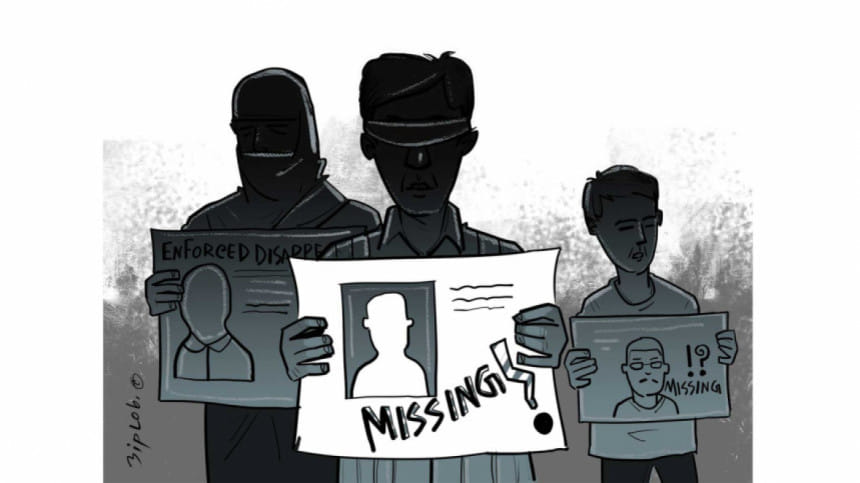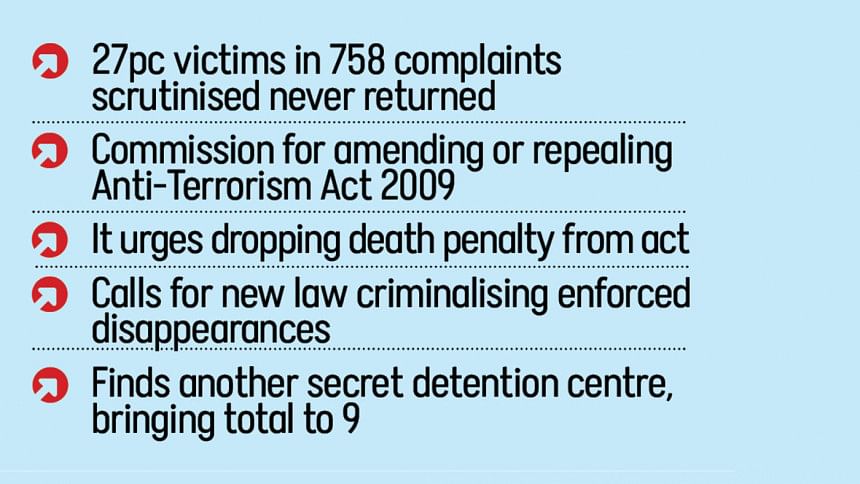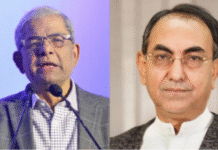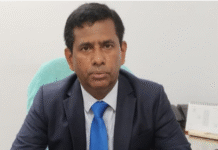
Former prime minister Sheikh Hasina, her defence adviser Maj Gen (retd) Tarique Ahmed Siddique, former director general of the National Telecommunication Monitoring Centre Maj Gen Ziaul Ahsan, and senior police officers Monirul Islam and Md Harun-Or-Rashid were all involved in enforced disappearances.
Commission for inquiry into enforced disappearances found prima facie evidence of their involvement, said a preliminary report submitted to the chief adviser yesterday.
The commission recommends disbanding Rab because of its inalienable involvement in enforced disappearances.
It found a “systematic design” that facilitated incidents of enforced disappearances go undetected, chairman of the commission Justice (retd) Mainul Islam Chowdhury said while submitting the report to Chief Adviser Prof Muhammad Yunus.
The forces collaborated with each other to pick up, torture, and keep victims in detention and deliberately compartmentalised the operations, the commission found.
The commission recorded 1,676 complaints of enforced disappearances.

Of the complaints, it has examined 758, of which 27 percent of the victims — approximately 200 people — never returned, said commission member Sajjad Hossain to The Daily Star.
Those who returned were mostly shown on records as arrested, said the rights activist.
The number of complaints the commission has scrutinised exceeds preliminary estimates collated over the years by human rights platforms like Mayer Daak and Odhikar.
Many who had not spoken out, fearing reprisal from the Awami League government, are now doing so, Sajjad said.
The commission estimates that the number of cases of enforced disappearances would be over 3,500.
Earlier, the commission members announced at a press conference that they had found eight secret detention centres in Dhaka and its outskirts.
The commission has since found one more Rab-run secret prison, said Sajjad.
While receiving the report yesterday, Prof Yunus said he would visit some of the joint interrogation cells and secret detention centres, better known as Aynaghar, as he wanted first-hand knowledge about the sufferings of the victims.
The commission also recommends repealing or heavily amending the Anti-Terrorism Act, 2009.
Sajjad said, “Terrorism is very vaguely defined in the law creating room for abuse. We have also recommended abolishing the death penalty under this law.”
The report called for the creation of a new law criminalising enforced disappearances.
They also told the government to repeal laws under the Armed Police Battalions Ordinance that grants law enforcers indemnity for acts done in “good faith”.
The committee also recommends that the government creates a National Preventive Mechanism as mandated by the UN Convention Against Torture to protect civilians from abuses, Sajjad said.
Last month, commission member Nur Khan Liton told a press conference that the commission found a cell operated by Rab measuring just 3.5 feet x 4 feet. The cell had no source of light, except a small peephole. People had been confined to such cells for years, he said.
Yesterday, the report was handed over to the chief adviser at the state guest house Jamuna.
The commission chairman told Yunus that another interim report would be delivered in March. It would take at least another year to scrutinise all the complaints.
Commission members Justice Farid Ahmed Shibli, human rights activist Nur Khan, BRAC University teacher Nabila Idris, and human rights activist Sajjad Hossain; Interim Government’s advisory council members Adilur Rahman Khan and Sharmeen S Murshid; Principal Secretary to Chief Adviser Md Siraj Uddin Mia; and Press Secretary Shafiqul Alam were present, among others.
Daily Star









